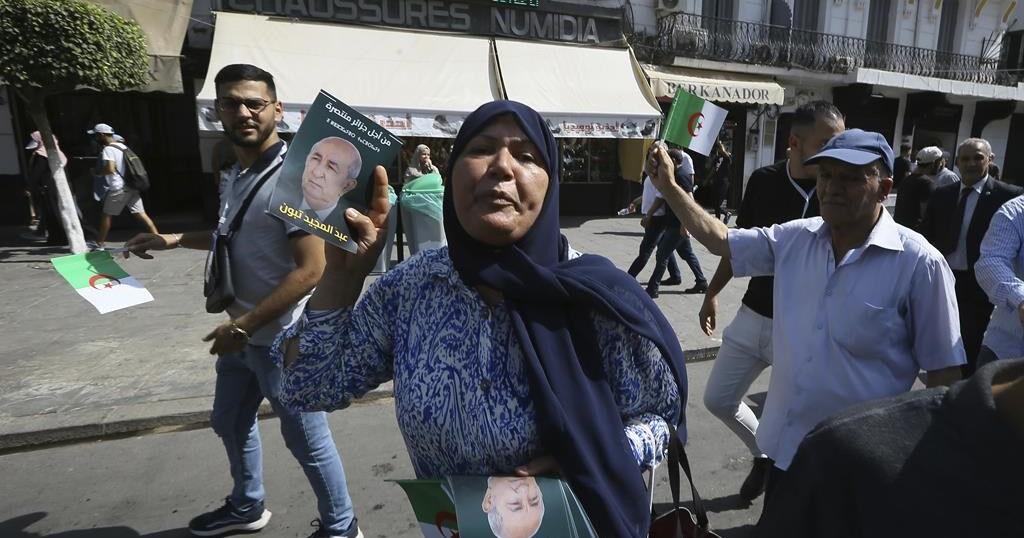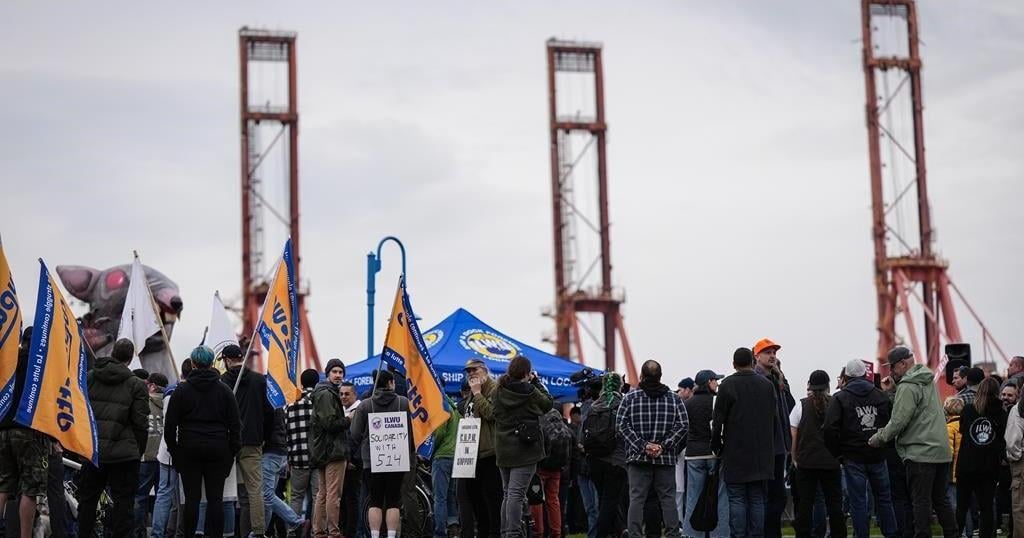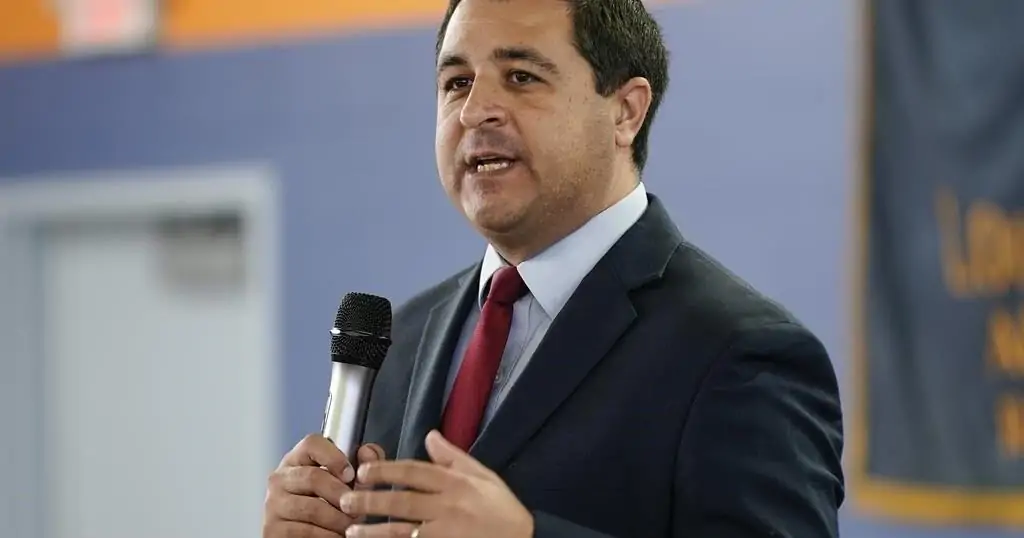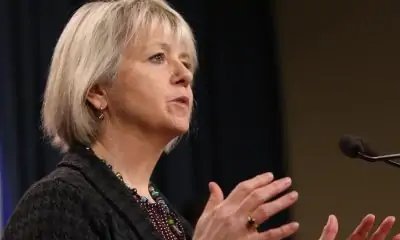ALGIERS, Algeria (AP) — Algerians head to the polls Saturday to cast votes for president and determine who will govern their gas-rich North African nation — five years after pro-democracy protests prompted the military to oust the previous president after two decades in power.
Since elections were scheduled in March — ahead of the predicted schedule — there has been little suspense about the result.
Though few doubt he will be named the winner by the time results are finalized, military-backed President Abdelmadjid Tebboune said on Saturday after voting that he hoped “whoever wins will continue on the path towards a point of no return in the construction of democracy.”
Rather than who wins, the larger question is how many voters will stay home.
Members of Tebboune’s government as well as his challengers have all urged voters to cast ballots after boycotts and high abstention rates in previous elections marred the government’s ability to claim popular support.
“I call on Algerians to vote en masse to reinforce our country’s democratic processes,” Mohamed Larbaoui, Tebboune’s Prime Minister, said at the polls Saturday.
Algeria is Africa’s largest country by area and, with almost 45 million people, it’s the continent’s second most populous after South Africa to hold presidential elections in 2024 — a year in which more than 50 elections are being held worldwide, encompassing more than half the world’s population.
The campaign — rescheduled to take place during North Africa’s hot summer — has been characterized by widespread apathy from the population, which continues to be plagued by high costs of living and a punishing drought that brought water shortages to some parts of the country.
On Saturday morning, many polling places sat mostly empty. Without crowds or lines of voters queuing to cast their ballots, administrators hoped things would pick up later in the day before polls close at 7 p.m.
“Residents generally vote in the afternoon,” said Rabah Belamri, poll station chief in Rouiba, a neighborhood east of downtown Algiers.
“Uncle Tebboune,” as his campaign has framed the 78-year-old, was elected in December 2019 after nearly a year of weekly “Hirak” demonstrations demanding the resignation of former President Abdelaziz Bouteflika. Their demands were met when Bouteflika resigned that April and was replaced by an interim government of his former allies, which called for elections later in the year.
Protestors opposed holding elections too soon, fearing the candidates running that year each were close to the old regime and would derail dreams of a civilian-led, non-military state. Tebboune, a former prime minister seen as close to the military, won. But his victory was stained by low turnout, boycotts and Election Day tumult, during which crowds sacked voting stations and police broke up demonstrations.
To cement his legitimacy, Tebboune hopes more of the country’s 24 million eligible voters will participate in Saturday’s election than in his first when only 39.9% voted.
But many of the last election’s boycotters remain unconvinced about elections ushering in change.
Activists and international organizations, including Amnesty International, have railed against how authorities continue prosecuting those involved in opposition parties, media organizations and civil society groups.
Some have also denounced this election as a rubber stamp exercise that can only entrench the status quo.
“Algerians don’t give a damn about this bogus election,” said former Hirak leader Hakim Addad, who was banned from participating in politics three years ago. “The political crisis will persist as long as the regime remains in place. The Hirak has spoken.”
Twenty-six candidates submitted preliminary paperwork to run in the election, although only two were ultimately approved to challenge Tebboune.
Neither political novices, they have avoided directly criticizing Tebboune on the campaign trail and, like the incumbent, emphasized participation.
Abdelali Hassani Cherif, a 57-year-old head of the Islamist party Movement of Society for Peace has made populist appeals to Algerian youth, running on the slogan “Opportunity!”
At his polling place Saturday, he thanked his opponents and said it was “an important election for the country’s future.”
Youcef Aouchiche, a 41-year-old former journalist running with the Socialist Forces Front, campaigned on a “vision for tomorrow,” and made appeals to those concerned about human rights and political repression. It’s the first time since 1999 that his party, which enjoys strong support among ethnic minorities in central Algeria, has put forth a candidate.
Voting in Kabylia on Saturday, Aouchiche called on Algerians to break with the system that rules the country “to give young people the confidence to put an end to the despair that drives them to take the boats of death in an attempt to reach the other side of the Mediterranean,” referencing many who elect to migrate to Europe in search of opportunity rather than remain at home.
Andrew Farrand, the Middle East and North Africa director at the geopolitical risk consultancy Horizon Engage, said both opposition candidates were more aimed at the 2025 legislative elections than the 2024 presidential contest. Because Algerian law funds political parties based on the number of seats they win in legislative elections, they hope campaigning positions them for a strong 2025 performance.
“It’s a long game: How can I mobilize my base? How can I build up a campaign machine? And how can I get into the good graces of the authorities so that I can be in a position to increase my seats?” he said. “We’ve seen that in their choice not to overtly criticize president … paired with a very strong message to Algerians to come out and vote.”





















